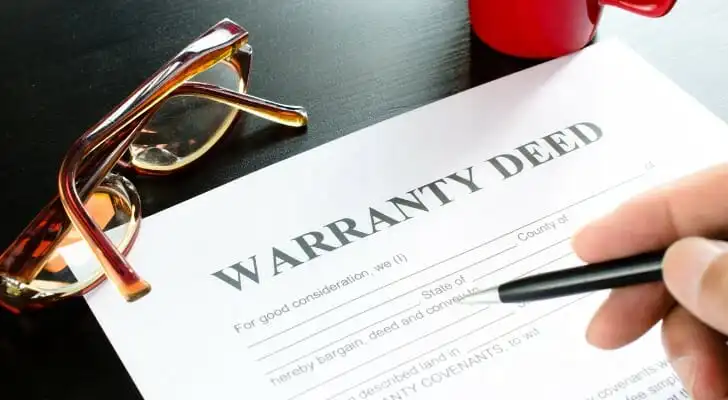When purchasing a home, there are a number of very important legal documents involved. Two such documents that you may encounter are a warranty deed and a deed of trust. Let’s break down what each document does, what the differences between them are, and when they might come up in the home-buying process.
A financial advisor can also help you navigate important financial decisions when buying real estate. Connect with a fiduciary advisor today.
What Is a Warranty Deed?
A warranty deed is a legal document that is used when transferring ownership of property from a grantor (seller) to a grantee (buyer). The seller provides it and guarantees certain protections to the buyer.
The warranty deed guarantees to the buyer (and the buyer’s lender, if applicable), that the property:
- Is owned by the seller, free and clear
- Does not have any outstanding debts, including mortgages
- Does not have any outstanding liens, judgments or encumbrances
A warranty deed affirms that the seller owns the property, has the right to sell it, and that no third parties can claim ownership. It is often issued as part of a title search and includes important details such as the address of the property, a description of the lot or parcel, information about the parties involved and the date of the transaction.
Getting a Warranty Deed
When it comes to warranty deeds, there are two types you could encounter: a general warranty deed and a special warranty deed.
A general warranty deed guarantees everything mentioned above and affirms that the property has a clear, transferable title. Generating one of these typically involves an extensive title search. If a lien, judgement or other claim to the property is later found or brought forward, the grantor who issued the general warranty deed can be held liable.
A special warranty deed offers fewer guarantees. It affirms that the seller owns the property and intends to sell it but only covers liens or claims that arose during the seller’s ownership.
Special warranty deeds don’t offer any guarantees for the timeframe before the current seller owned the property. This means that a claim or old lien against the property could eventually surface and impact the new buyer. The seller who signed the special warranty deed is not liable, though, unless the claim in question relates to when they owned the property.
What Is a Deed of Trust?

A deed of trust is a different type of real estate document that you may receive when buying a home and can replace a mortgage loan in certain states. Essentially, this document is the buyer’s agreement to repay their mortgage lender according to the terms of their new home loan. A deed of trust is issued at closing, and involves three parties: the trustor (borrower), trustee (third-party who will hold the title; usually the title company) and beneficiary (lender).
Like a mortgage loan agreement, the deed of trust outlines key details. It includes the property description, loan amount, repayment terms, default consequences, fees and loan schedule.
When a lender issues a deed of trust, the borrower provides a promissory note in return. This note binds the buyer to repay the loan. Once the loan is paid off, the lender returns the note, marks it as paid and the trustee transfers the title to the buyer.
Using a Deed of Trust
Certain states use deeds of trust instead of mortgage loans:
- Alaska
- California
- Colorado
- District of Columbia
- Georgia
- Hawaii
- Idaho
- Maine
- Massachusetts
- Minnesota
- Mississippi
- Missouri
- Nebraska
- Nevada
- New Hampshire
- New Mexico
- North Carolina
- Oregon
- Rhode Island
- Tennessee
- Texas
- Utah
- Virginia
- Washington
- West Virginia
- Wyoming
In Alabama, Arizona, Arkansas, Illinois, Kentucky, Maryland, Michigan, Montana and South Dakota, lenders can choose to use either a deed of trust or a mortgage. In the remaining states, only a mortgage loan is allowed.
Bottom Line

When buying a home, you are likely to encounter a warranty deed, a deed of trust… or sometimes, both. However, while these two legal documents are an important part of the real estate process, and often involve a title company, they play two very different roles. A warranty deed ensures a buyer that the property is owned by the seller and can be sold without any encumbrances. A deed of trust is used in certain states and represents a buyer’s guarantee with their lender to repay the property loan as scheduled.
Homebuying Tips
- As you think about buying a home, consider how your mortgage payments will fit into you monthly budget. SmartAsset has a mortgage calculator that can help you estimate your monthly payment and total interest you’ll pay. Meanwhile, our closing costs calculator can also give you a sense of how much you can expect to pay in extra fees.
- A financial planner can help you plan for a home purchase, including setting a budget and saving for your down payment. Finding a financial advisor doesn’t have to be hard. SmartAsset’s free tool matches you with vetted financial advisors who serve your area, and you can have a free introductory call with your advisor matches to decide which one you feel is right for you. If you’re ready to find an advisor who can help you achieve your financial goals, get started now.
Photo credit: ©iStock.com/maybefalse, ©iStock.com/wsmahar, ©iStock.com/Hispanolistic
